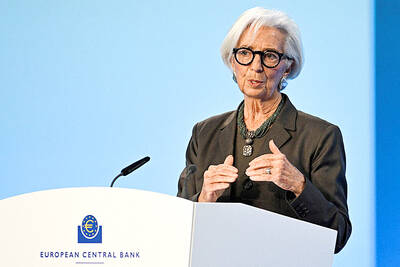China’s leadership has told the country’s state-owned mining firms to produce coal at full capacity for the rest of the year even if they exceed annual quotas as the country struggles with a deepening power crisis.
The directive, along with other measures to secure energy supplies for this winter at all costs, was emphasized during emergency meetings this week in Beijing, people familiar with the matter said. Boosting domestic thermal coal production is critical, the sources said, asking not to be named as the discussion contents are not public.
The government has been holding a series of meetings with company executives this week in a sign of how serious the situation in China has become. Many regions have had to curtail the supply of electricity to the industrial sector, while some residential areas have lost power due to an energy crisis that’s gripped the world’s second-largest economy.
Chinese Premier Li Keqiang (李克強) has vowed that every effort would be taken to maintain economic growth. Li told a meeting with foreign diplomats on Thursday that China would ensure that the needs of basic livelihoods are met while keeping industrial and supply chains stable, China National Radio said.
China’s struggles have also been unleashing turmoil in global commodities markets, fueling rallies in everything from fertilizer to silicon. Authorities might be especially concerned about energy security this year, with the high-profile Winter Olympics due to be held in and around Beijing in February.
The country controls coal production under a quota system that caps annual output of mines in order to manage supply. Authorities have also been clamping down on illegal mining, blamed for a spate of fatal accidents. China is still the world’s largest producer of the fossil fuel, producing about 3.8 billion tonnes per year during the past decade, roughly half of global output. Coal accounts for about 70 percent of the nation’s electricity generation.
The cheap energy source has been key to China’s dramatic economic growth since the 1980s, but it also triggered criticism over the rise in pollution from mining and processing the fuel. Coal mines are under close environmental surveillance, and Beijing has been pushing for consolidation in the sector.
The nation’s top mining company, China Energy Investment Corp (國家能源投資集團), is expected to produce 25 percent of its annual production capacity in the fourth quarter, it said on its official social media account on Thursday.
“We will strive to achieve full production and increase supply,” the company said. Its coal output was 530 million tonnes last year.
Another state-owned mining firm, State Power Investment Corp (國家電利投資集團), said on social media that it plans to deliver no less than 50 percent of its fourth-quarter output from operations in eastern Inner Mongolia to northeastern China, where some homes lost power last weekend.
It also plans to sell 25 percent of its annual term-sales volumes to buyers nationwide this quarter, it said.
Chinese coal mines, especially in the private sector, have been reluctant to produce excessive quantities, as any new or reopened operations must meet tighter environmental standards under Chinese President Xi Jinping’s (習近平) green targets.
The penalty for violating workplace safety rules was raised from fines to possible jail time in March, making mine operators even more hesitant to boost production. Moreover, since China set a goal to lower coal’s share in its overall energy mix, some financial institutions have stopped lending to the sector.
Chinese coal futures surged to a record on Thursday before the week-long holidays. Prices have more than doubled this year amid soaring electricity demand from factories and slow output growth from mines.

European Central Bank (ECB) President Christine Lagarde is expected to step down from her role before her eight-year term ends in October next year, the Financial Times reported. Lagarde wants to leave before the French presidential election in April next year, which would allow French President Emmanuel Macron and German Chancellor Friedrich Merz to find her replacement together, the report said, citing an unidentified person familiar with her thoughts on the matter. It is not clear yet when she might exit, the report said. “President Lagarde is totally focused on her mission and has not taken any decision regarding the end of

French President Emmanuel Macron told a global artificial intelligence (AI) summit in India yesterday he was determined to ensure safe oversight of the fast-evolving technology. The EU has led the way for global regulation with its Artificial Intelligence Act, which was adopted in 2024 and is coming into force in phases. “We are determined to continue to shape the rules of the game... with our allies such as India,” Macron said in New Delhi. “Europe is not blindly focused on regulation — Europe is a space for innovation and investment, but it is a safe space.” The AI Impact Summit is the fourth

CONFUSION: Taiwan, Japan and other big exporters are cautiously monitoring the situation, while analysts said more Trump responses ate likely after his loss in court US trading partners in Asia started weighing fresh uncertainties yesterday after President Donald Trump vowed to impose a new tariff on imports, hours after the Supreme Court struck down many of the sweeping levies he used to launch a global trade war. The court’s ruling invalidated a number of tariffs that the Trump administration had imposed on Asian export powerhouses from China and South Korea to Japan and Taiwan, the world’s largest chip maker and a key player in tech supply chains. Within hours, Trump said he would impose a new 10 percent duty on US imports from all countries starting on

STRATEGIC ALLIANCE: The initiative is aimed at protecting semiconductor supply chain resilience to reduce dependence on China-dominated manufacturing hubs India yesterday joined a US-led initiative to strengthen technology cooperation among strategic allies in a move that underscores the nations’ warming ties after a brief strain over New Delhi’s unabated purchase of discounted Russian oil. The decision aligns India closely with Washington’s efforts to build secure supply chains for semiconductors, advanced manufacturing and critical technologies at a time when geopolitical competition with China is intensifying. It also signals a reset in relations following friction over energy trade and tariffs. Nations that have joined the Pax Silica framework include Japan, South Korea, the UK and Israel. “Pax Silica will be a group of nations